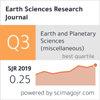鉴于COVID-19大流行,印度的地质教育情景和开放教育资源的作用
IF 0.5
4区 地球科学
Q4 GEOSCIENCES, MULTIDISCIPLINARY
引用次数: 0
摘要
地质教育在任何国家的社会、经济和文化发展中都起着重要作用。印度是一个巨大的多元化国家,地质特征广泛,由所有地质时代的岩石组成,地理区划发达。印度岩石圈板块是巨大的地质资源宝库,也是开发和测试众多地质原理的天然野外实验室。印度的地质资源勘探始于过去;有组织的探索早在19世纪30年代就开始了。然而,提供地质教育的机构数量相对较少。因此,根据2011-2012年至2018-2019年硕士学位课程的招生数据,与物理、化学、动物学、植物学和环境科学等其他科学学科相比,地质学作为一门科学学科的受欢迎程度较低。分析表明,在地质学学位课程的教学方法中,国外的教学资源占主导地位,超过了印度的教学资源。2019冠状病毒病大流行以两种方式影响地质教育,即传统(面对面)教学的中断,以及地质学课程的学习者无法完成强制性的户外地质实地考察任务。对在线问卷调查收集的数据进行的分析表明,在地质学中使用土著开放教育资源似乎是克服COVID-19大流行造成的学习障碍的可行解决方案,同时也丰富了印第安裔的教学资源。本文详细介绍了地质教育的必要性和演变、地质学作为一门科学学科的当前受欢迎程度、现有地质教学资源的性质、2019冠状病毒病对地质教育的影响,以及开放教育资源在提供高质量和公平的地质教育方面的作用,同时消除了2019冠状病毒病在印度造成的教育障碍。本文章由计算机程序翻译,如有差异,请以英文原文为准。
Geological education scenario in India and role of open educational resources in the light of COVID-19 pandemic
Geological education plays a major role in the social, economic, and cultural growth and development of any country. India is a vast diversified country with wide-ranging geological features, consisting of rocks of all geological ages with well-developed physiographic divisions. The Indian lithospheric plate is a storehouse of vast georesources and also serves as a natural field laboratory for developing and testing numerous geological principles. The exploration of Indian georesources began in the past; with the organized exploration began way back in the 1830s. The number of institutions offering geological education is, however, comparatively low. Thus, Geology as a science discipline is less popular in comparison with other science subjects such as Physics, Chemistry, Zoology, Botany, and Environmental science, based on enrolment data of the learners enrolled in academic sessions from 2011-2012 to 2018-2019 of the Master's degree programs. Analysis indicates that teaching-learning resources of foreign origin are dominantly being adopted as learning resources in the teaching-learning pedagogy of degree programs in Geology, and are over-riding those of Indian origin. The COVID-19 pandemic is affecting geological education in two ways namely, the disruption of conventional (face-to-face) teaching together with not allowing learners of Geology programs to complete their compulsory out-door geological fieldwork assignments. The analysis of data gathered by an online questionnaire survey shows that the use of indigenous open educational resources in Geology appears as a plausible solution to overcome the learning barriers created by the COVID-19 pandemic, and also to enrich teaching-learning resources of Indian origin. This article provides an up-to-date detailed account of the necessity and evolution of geological education, the current popularity of Geology as a science discipline, the nature of available geological teaching-learning resources, the impact of the COVID-19 on geological education, and the role of open educational resources in providing quality and equitable geological education, whilst removing educational barriers created by COVID-19 in India.
求助全文
通过发布文献求助,成功后即可免费获取论文全文。
去求助
来源期刊

Earth Sciences Research Journal
地学-地球科学综合
CiteScore
1.50
自引率
0.00%
发文量
0
审稿时长
>12 weeks
期刊介绍:
ESRJ publishes the results from technical and scientific research on various disciplines of Earth Sciences and its interactions with several engineering applications.
Works will only be considered if not previously published anywhere else. Manuscripts must contain information derived from scientific research projects or technical developments. The ideas expressed by publishing in ESRJ are the sole responsibility of the authors.
We gladly consider manuscripts in the following subject areas:
-Geophysics: Seismology, Seismic Prospecting, Gravimetric, Magnetic and Electrical methods.
-Geology: Volcanology, Tectonics, Neotectonics, Geomorphology, Geochemistry, Geothermal Energy, ---Glaciology, Ore Geology, Environmental Geology, Geological Hazards.
-Geodesy: Geodynamics, GPS measurements applied to geological and geophysical problems.
-Basic Sciences and Computer Science applied to Geology and Geophysics.
-Meteorology and Atmospheric Sciences.
-Oceanography.
-Planetary Sciences.
-Engineering: Earthquake Engineering and Seismology Engineering, Geological Engineering, Geotechnics.
 求助内容:
求助内容: 应助结果提醒方式:
应助结果提醒方式:


